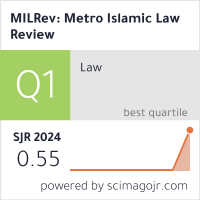Health Law in Islam (Study of Law About Organ Transplant Accoring to Fiqh)
(Study Of Law About Organ Transplant Accoring To Fiqh)
DOI:
https://doi.org/10.32332/milrev.v1i1.6196Keywords:
Health, Islamic Law, Transplantation.Abstract
Health is an important factor in human life because in healthy conditions, humans can carry out activities comfortably and do a lot of good by providing benefits to others. Everyone always strives for various ways and efforts that are considered good to support health. Transplantation is one of the many ways to cure disease that can be done using technology. Transplantation is a problem that falls within the scope of Islamic law which is not only a classical problem but has also entered the scope of contemporary problems. In looking at a legal phenomenon that occurs, Islamic legal experts analyze legal cases by looking at what has been determined by the Al-Quran and Hadith. The response of Islamic law to the emergence of the phenomenon of organ transplantation is proof of the relevance of Islamic law in covering problems in the health sector. Therefore, this research will discuss the concept of health in Islamic law through an analysis of the law on organ transplantation. Regarding organ transplants, Islam highly respects the glory of humans, both living and dead. Humans are blessed with a perfect body shape, intelligent mind and the ability to regulate this universe. So it is natural that God glorifies humans above other creatures. That's why we are prohibited from trampling on other people's dignity. One must not destroy one's soul, self-esteem, feelings, even towards a corpse.










